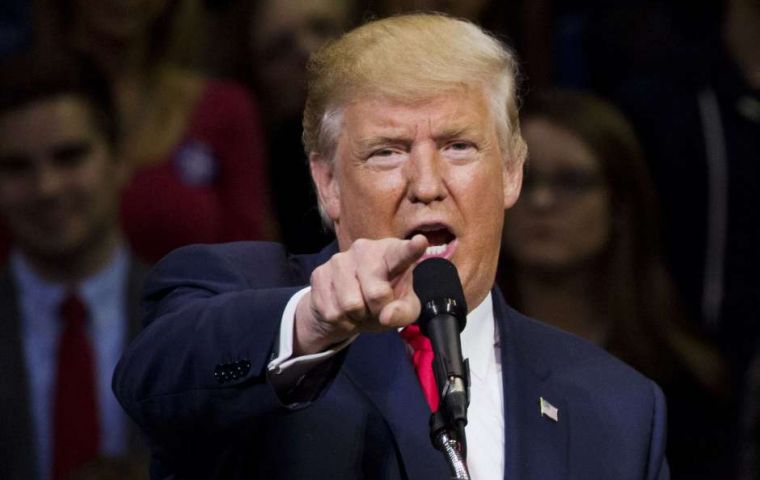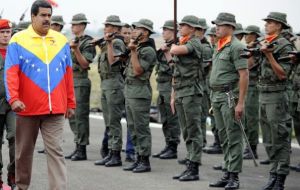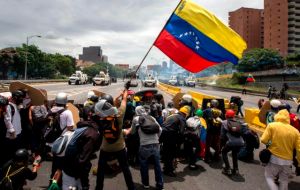MercoPress. South Atlantic News Agency
Trump planned invading Venezuela
 Amid its rapidly deteriorating economy and weakening law and order, Venezuela received threats from the US president Donald Trump to restore democracy in the country
Amid its rapidly deteriorating economy and weakening law and order, Venezuela received threats from the US president Donald Trump to restore democracy in the country  For Maduro, Trump's bellicose declarations allowed him to recover, for a short time, some of the popularity lost just when he was blamed for the food shortage and hyperinflation
For Maduro, Trump's bellicose declarations allowed him to recover, for a short time, some of the popularity lost just when he was blamed for the food shortage and hyperinflation  The repression of 2017 protests, which left dozens dead, demoralized Venezuelans to a great extent, and the threat of further repression has forced dozens of opposition leaders to go into exile.
The repression of 2017 protests, which left dozens dead, demoralized Venezuelans to a great extent, and the threat of further repression has forced dozens of opposition leaders to go into exile. Associated Press (AP) revealed that last August, during a meeting in the Oval Office, US President Donald Trump asked a question that startled his advisors: given that the situation in Venezuela threatens regional security, why does the United States not invades the South American country?
The question stunned those present at the meeting, including the Secretary of State, Rex Tillerson, and the National Security Adviser, General H.R. McMaster, who are no longer part of the American executive this year.
AP report contains the hitherto unknown account of the conversation comes from a senior government official familiar with what was said then, who spoke on condition of anonymity because of the sensitivity of the matter.
In a conversation that lasted about five minutes, McMaster and others, speaking in turn, explained to Trump the negative consequences of an invasion, which would cost Washington the support of Latin American governments, won with great effort, only to sanction President Nicolás Maduro for taking Venezuela by the path of the dictatorship.
But Trump had an answer. Without giving the slightest indication that he was going to order the elaboration of military plans, he said that there were several examples of what he considered the successful use of force in the region, according to the source, such as the invasions of Panama and Granada in the 1980s.
The idea of the military option would continue to hover in the president's mind despite the attempts of his advisers to crush it, and he would raise it twice more with Latin American leaders.
The next day, August 11, Trump provoked amazement in friends and enemies alike by speaking of a “military option” to overthrow Maduro. At first these public statements were considered as the kind of martial bravado that could be expected from the reality TV star turned commander in chief.
But shortly after, he spoke about the matter with Colombian President Juan Manuel Santos, the official said. Two Colombian officials confirmed the information, speaking on condition of anonymity to avoid antagonizing Trump.
And in September, during the UN General Assembly, Trump returned more extensively on the subject at a private dinner with Santos and three other Latin American allies, said the same three sources and reported the online magazine Politico in February.
According to the US official, Trump was specifically told not to talk about the matter, which would have a bad impact, but the first thing the president said during the dinner was: “My staff told me not to talk about this.” He then asked each president if he was sure he did not want a military solution, the official said, adding that each one answered Trump clearly that he was sure.
Finally, McMaster would explain to the president in a solo conversation what the dangers of an invasion were.
Taken together, these backroom conversations, which had not been previously reported in detail and in full, reveal how the Venezuelan economic and political crisis has received attention at the peak that would have been inconceivable during the presidency of Barack Obama. But according to its detractors, it shows how the foreign policy of “the United States first” can sometimes seem directly reckless and give arguments to the enemies of the country.
The White House declined to comment on the private talks. But a spokesman for the National Security Council reiterated that the United States will study all the options at its disposal to help restore democracy and bring stability to Venezuela. Under the leadership of Trump, the United States, Canada and the European Union have applied sanctions against dozens of senior Venezuelan officials and the same senior citizen, whom they accuse of corruption, drug trafficking and human rights violations. Washington has contributed more than 30 million dollars to Venezuela's neighbors to help them absorb more than one million migrants who have fled the country.
For Maduro, who has long denounced that the United States has military plans to seize Venezuela and its huge oil reserves, Trump's bellicose declarations allowed him to recover, although for a short time, some of the popularity lost just when he was blamed for the food shortage and hyperinflation. A few days after the president's statements on the military option, Maduro sent his loyalists to the streets of Caracas to condemn the “emperor” Trump's belligerence, ordered military exercises throughout the country and threatened jail opponents who, according to him, they conspired with Washington to overthrow him.
”If the supposed denying of the patriotic soil was denied, the rifles would arrive in New York, Mr. Trump, we would take the White House, (because) until Vietnam it would remain small“, growled Nicolás Maduro, son of the president Maduro, in the Constituent Assembly , integrated only by supporters of the government.
Even the most bitter allies in the United States were forced to reluctantly support Maduro against Trump's belligerent words. Santos, a staunch supporter of US attempts to isolate Maduro, said an invasion would enjoy zero support in the region. The Mercosur customs alliance, which includes Brazil and Argentina, said in a statement that ”the only acceptable instruments for the promotion of democracy are dialogue and diplomacy,” and that it repudiated any option that implied the use of force.
But in the embattled Venezuelan opposition movement, hostility to the idea of military intervention has begun to subside.
Weeks after Trump's public statements, Harvard economics professor and former Venezuelan planning minister Ricardo Hausmann wrote an opinion column entitled “D-Day in Venezuela” in which he appealed to a “coalition of the willing” made up of regional powers. and the United States to intervene and give military support to a government appointed by the National Assembly, led by the opposition.
Mark Feierstein, in charge of Latin American affairs at the National Security Council under the Obama administration, said a spectacular move by Washington in Venezuela, however acceptable, would not force Maduro to let go of the reins of power if pressure does not accompany it by street protests. In addition, he believes that the repression of last year's protests, which left dozens dead, has demoralized Venezuelans to a great extent, and the threat of further repression has forced dozens of opposition leaders to go into exile.
“People inside and outside the government know they can ignore a lot of what Trump says,” said Feierstein, now a senior adviser at the Albright Stonebridge Group, about statements about a military invasion of Venezuela.“ The worrying thing is that it generated expectations among many Venezuelans who are hopeful that an external actor will come to save them.”




Top Comments
Disclaimer & comment rules-

-

-

Read all commentsMan, I am severely worried.... that my supply of popcorn will not suffice for Emperor Trump's entire reign!
Jul 07th, 2018 - 12:51 am 0REF: “Trump planned invading Venezuela”:
Jul 07th, 2018 - 05:13 pm 0Maybe be he itches to own yet another lost war to USA's credit?
Uhhhh - does Maduro have anything we're interested in?
Jul 08th, 2018 - 03:51 pm 0Commenting for this story is now closed.
If you have a Facebook account, become a fan and comment on our Facebook Page!